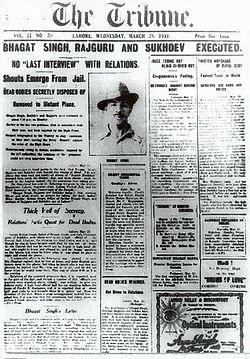Early life
Sukhdev Thapar, born in Ludhiana, Punjab, British India to Ramlal Thapar and Ralli Devi in a Khatri family. Sukhdev's father died and he was brought up by his uncle Lala Achintram.[2]Revolutionary activities
HSRA
Sukhdev Thapar was a member of the Hindustan Socialist Republican Association (HSRA), and organised revolutionary cells in Punjab and other areas of North India.[3] He was the chief of Punjab unit of HSRA and instrumental in taking decisions.Sukhdev is best remembered for his involvement in the Lahore Conspiracy Case of 18 December 1928 and its aftermath.[3] He was an accomplice of Bhagat Singh, and Shivaram Rajguru, whose conspiracy led to the assassination of Deputy Superintendent of Police, J. P. Saunders in 1928 in response to the violent death of a veteran leader.[3]
Lahore Conspiracy Case 1930
Sukhdev participated in numerous revolutionary activities such as the 'Prison hunger strike' in 1929; he is best known for his assaults in the Lahore Conspiracy Case (18 December 1928).[4] Sukhdev was the prime accused in the Lahore Conspiracy Case of 1930, whose title reads "Crown versus Sukhdev and others". The first information report (FIR) of the Lahore Conspiracy Case, filed by Hamilton Harding, senior superintendent of police, in the court of R.S. Pandit, special magistrate in April 1929, mentions Sukhdev as accused number 1. It describes him as Swami alias villager, son of Ram Lal, caste Thapar Khatri. In a list of 25 accused, Bhagat is on the 12th position, while Rajguru is on the 20th position. It’s Sukhdev who leads the pack.[1] Bhagat Singh and Shivaram Rajguru, who had been concerned in the assassination of Deputy Superintendent of Police, J.P. Saunders in 1928, consequently avenging the death of a veteran leader, Lala Lajpat Rai, owing to immoderate police beating within the Conspiracy case. After the Central Assembly Hall bombings in New Delhi (8 April 1929), Sukhdev and his accomplices were arrested and convicted of their crime, going through the loss of life sentence as the verdict.Execution
Front page of The Tribune announcing the executions
Reactions to the executions
The executions were reported widely by the press, especially as they took place on the eve of the annual convention of the Congress party at Karachi.[5] The New York Times reported:A reign of terror in the city of Cawnpore in the United Provinces and an attack on Mahatma Gandhi by a youth outside Karachi were among the answers of the Indian extremists today to the hanging of Bhagat Singh and two fellow-assassins.[6]
Legacy and memorials
National Martyrs Memorial for Sukhdev, Bhagat Singh and Rajguru


No comments:
Post a Comment